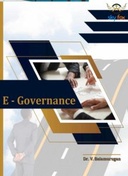Explore

E-Governance refers to the use of Information and Communication Technologies (ICT) to enhance and streamline the delivery of government services, improve transparency, foster citizen engagement, and optimize administrative processes. It encompasses a broad range of digital tools and platforms that enable governments to interact with citizens, businesses, and other stakeholders, ultimately promoting efficiency, accountability, and better public service delivery.
The book examines the benefits of e-governance, including increased efficiency, reduced corruption, enhanced accessibility, and improved citizen satisfaction. However, it also highlights challenges such as digital divide, cybersecurity risks, privacy concerns, and the need for digital literacy among both citizens and government officials. The importance of a strong legal and regulatory framework to support e-governance initiatives is also discussed, along with the need for effective infrastructure, collaboration, and transparency.
Furthermore, the paper reflects on the global trends in e-governance, considering the role of smart cities, open data initiatives, and the rise of digital democracy. The future of e-governance is explored in terms of emerging technologies like artificial intelligence, blockchain, and the Internet of Things (IoT), which have the potential to transform public administration and foster more participatory and responsive governance systems.
This book is included in DOAB.
Why read this book? Have your say.
You must be logged in to comment.
Rights Information
Are you the author or publisher of this work? If so, you can claim it as yours by registering as an Unglue.it rights holder.Downloads
This work has been downloaded 33 times via unglue.it ebook links.
- 33 - pdf (CC BY) at skyfox.co.
Keywords
- citizen engagement
- cybersecurity
- digital democracy
- E-governance
- ICT
- Public administration
- thema EDItEUR::U Computing and Information Technology
Links
DOI: 10.22573/spg.020.BK/S/012Editions

